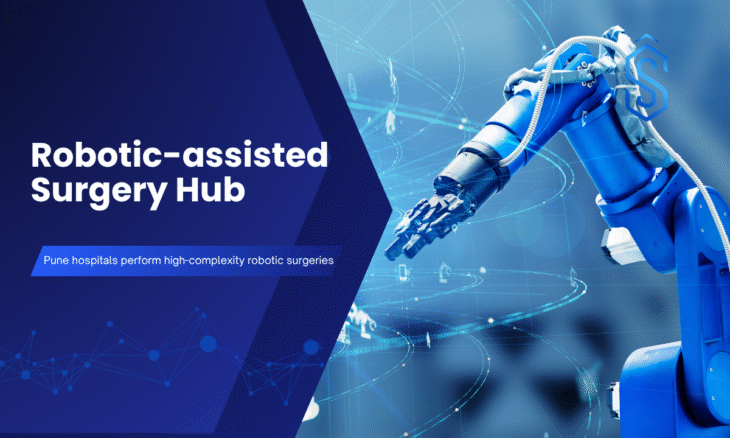Pune has emerged as one of India’s most advanced Robotic-assisted Surgery Hub, combining clinical excellence, structured training, and accessible healthcare.
With thousands of robotic-assisted procedures performed annually and more than 50 surgeons trained in the past few years, the city is redefining standards in minimally invasive and high-precision surgery across oncology, urology, gynecology, gastrointestinal, and pediatric care.
Pune’s Robotic-assisted Surgery Hub Revolutionizes Advanced Care
The city’s hospitals are performing high-complexity robotic surgeries at volumes comparable to major metros but at nearly 20% lower costs. The adoption of next-generation systems like the da Vinci Surgical System has enabled faster patient recovery, reduced complications, and improved long-term outcomes.
Also Read: Sahyadri Hospital, Hadapsar Awarded INFUZE Certification for Excellence in Infusion Therapy
Pune’s rise as a Robotic-assisted Surgery Hub is driven by an integrated model that merges advanced surgical technology, specialized clinical teams, and structured surgeon training.
Dinanath Mangeshkar Hospital Leads Pune’s Robotic Surgery Transformation
At the forefront of this transformation is Dinanath Mangeshkar Hospital (DMH), which has completed over 200 robotic procedures and performs 12–15 complex surgeries monthly.
These include prostate, kidney, and bladder cancer cases, along with advanced urological surgeries such as IVC thrombectomy, groin node dissection for penile cancer, testicular cancer, and robotic urinary diversions.
Dr Ashwin Tamhankar, Consultant – Urological Oncology and Robotic Surgery at DMH, shared, “Our exclusive focus on uro-oncology and robotic cancer care has enabled us to maintain consistent excellence. We’re seeing younger patients with kidney cancers, and DMH now serves as a regional referral centre for kidney-sparing partial nephrectomy surgeries.”
He further noted that their multidisciplinary approach – including uro-radiologists, uro-pathologists, uro-physiotherapists, and fellowship-trained uro-oncologists – has led to faster recovery, minimal ICU stay, and shorter hospitalization periods. Even high-risk patients often bypass the ICU post-surgery, thanks to enhanced recovery protocols.
Also Read: Pune: MOC Cancer Care and Research Centre Opens Its Fifth Facility in Baner
Robotic-assisted Surgery Hub: Training and Fellowship Fuel the Growth
Structured surgeon training is a cornerstone of DMH’s program. As a recognized proctoring centre, the hospital mentors surgeons nationwide through the early stages of robotic surgery adoption.
Dr. Tamhankar emphasized, “The success of robotic-assisted surgery depends not just on technology but also on comprehensive training. We’re launching a dedicated fellowship in Urological Oncology that blends real-world surgical experience with simulation and mentorship.”
Affordable and Accessible Robotic Care Driving Patient Inflow
Beyond medical excellence, Pune’s relatively low cost of living and healthcare affordability are attracting patients from across Maharashtra, Madhya Pradesh, and metropolitan regions like Mumbai.
The city’s emphasis on organ-preserving and minimally invasive treatments aligns with growing patient demand for better recovery and quality of life post-surgery.
With strong clinical leadership and continued investment in advanced surgical systems, Pune’s Robotic-assisted Surgery Hub model demonstrates how innovation and skill development can decentralize cutting-edge healthcare delivery across India.




